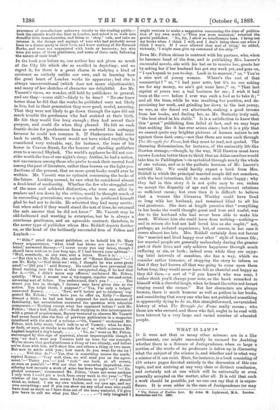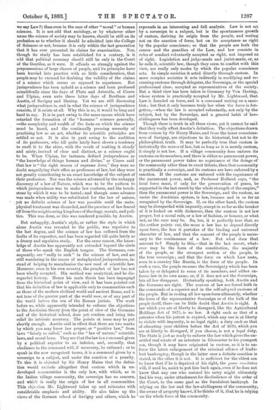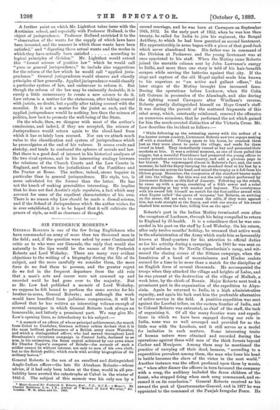WHIT IS LAW?*
Jr it were not that so many other sciences are in a like predicament, one might reasonably be excused for doubting whether there is a Science of Jurisprudence, when so large a portion of the works of its professors is taken up in discussing what the subject of the science is, and Whether and in what way a science of it can exist. Here, for instance, is a book consisting of 419 octavo pages devoted entirely to the discussion of this one topic, and not arriving at any very clear or distinct conclusion, and certainly not at one which will be universally or even generally accepted on the matter, after all. It is odd that such a work should be possible, yet no one can say that it is super- fluous. It is even odder in the case of Jurisprudence (or may • The Datum of Positive Law. By John M. Ligbtwood, London. . Macmillan and Co. 18133.
we say Law ?) than even in the case of other " moral " or human sciences. It is not odd that sociology, or by whatever other name the science of society may be known, should be still on its probation as to whether it should be admitted into the College of Sciences or not, because it is only within the last generation that it has ever presented its claims for examination. Nor, though its study has been established for a century, is it odd that political economy should still be only in the Court of the Gentiles, as it were. It offends so strongly against the prepossessions of large classes of people, and its principles have been hurried into practice with so little consideration, that people may be excused for doubting the validity of the claims of a science which seems so opposed to experience. But jurisprudence has been upheld as a science and been professed scientifically since the days of Plato and Aristotle, of Cicero and Ulpian, even unto these latter days of Bentham and Austin, of Savigny and Ihering. Yet we are still discussing what jurisprudence is, and in what the science of jurisprudence consists, if it exists at all. Why this is so, it would be long and hard to say. It is in part owing to the same causes which have retarded the formation of the " humane " sciences generally, —the complexity and wealth of the facts on which the science must be based, and the continually pressing necessity of practising law as an art, whether its scientific principles are settled or not. It is also in part owing to the ambition of its professors, who till quite lately have shown a tendency to exalt it to the skies, with the result of making it cloudy' and misty, instead of clear and distinct, as a science ought to be. When Ulpian, for instance, defined jurisprudence as " the knowledge of things human and divine," or Cicero said that law is "the right reason of supreme Jove," they were no doubt magnifying their office as professors of law, but they were not greatly contributing to an exact knowledge of the subject of their profession. Nor was the science advanced by the unhappy discovery of a law of Nature, which was to he the pattern to which jurisprudence was to make law conform, and the touch- stone by which it was to be tested ; and though some advance was made when utility was substituted for the law of nature, yet no definite science of law was possible until the meta- physical treatment was discarded, and the province of law fenced off from the neighbouring kingdoms of theology, morals, and poli- tics. This was done, or this was rendered possible, by Austin.
But unhappily, Austin's style, or rather the style in which alone Austin was revealed to the public, was repulsive to the last degree, and the science of law has suffered from the faults of its expositor, and has been regarded till quite lately as a dreary and repulsive study. For the same reason, the know- ledge of Austin has apparently not extended beyond the circle of those who speak the English tongue. The Germans, con- sequently, are "sadly to seek" in the science of law, and are still wandering in the mazes of metaphysical jurisprudence, in- stead of helping to macadamise the new road of scientific law. Moreover, even in his own country, the prophet of law has not been wholly accepted. His method was analytical, and he dis- regarded history. Hence his main thesis has been impugned from the historical point of view, and it has been pointed out that his definition of law is applicable only to communities such as those of the modern civilised world and ancient Rome, and is not true of the greater part of the world now, or of any part of the world before the era of the Roman jurists. The work before us, while apparently intended to enforce the objections to the Austinian theory from the point of view of the Germans and of the historical school, does yet confirm and bring into relief its intrinsic accuracy. The points at issue may be put shortly enough. Austin said in effect that there are two marks by which you may know law proper, or "positive law," from laws "falsely so called," such as the "law of nature," scientific laws, and moral laws. They are that the law is a command given by a political superior to an inferior, and, secondly, that obedience to the command will, if necessary, be enforced ; or to speak in the now recognised terms, it is a command given by a sovereign to a subject, and under the sanction of a penalty. To this it is objected by Sir Henry Maine that the defini- tion would exclude altogether that custom which in un- developed communities is the only law, with which, as in the Indian village community, the sovereign has no concern, and which is really the origin of law in all communities. This objection Mr. Lightwood takes up and reiterates with considerable emphasis and ability. He also takes up the views of the German school of Savigny and others, which he expounds in an interesting and full analysis. Law is not set by a sovereign to a subject, but is the spontaneous growth of custom, deriving its origin from the people, and resting not on the sanction of force, but on its acceptance as right by the popular conscience; so that the people are both the source and the guardian of the Law, and law consists in rules of conduct voluntarily accepted as right, not imposed as of right. Legislation and judge-made and jurist-made, or, as he calls it, scientific law, though they seem to conflict with this. view, are really only modes by which the popular conscience acts. In simple societies it acted directly through custom. In more complex societies it acts indirectly in modifying and re- creating customs through delegates, the Sovereign, or the special professional class, accepted as representatives of the society.. But a third view has been taken in Germany by Von Ihering, whose system is practically accepted by Mr. Lightwood, that Law is founded on force, and is a command resting on a sauc.- tion ; but that it only becomes truly law when the force is for- gotten,.—when the law is accepted voluntarily, not only by the subject, but by the Sovereign, and a general habit of law- abidingness has been developed.
Though there is truth in all these views, yet it cannot be said that they really affect Austin's definition. The objections drawu from custom by Sir Henry Maine, and from the inner conscious- ness of Savigny, are objections to its historical, but not to its philosophical, truth. It may be perfectly true that custom is, historically the source of law, but so long as it is merely custom,. it simply is not law. If a village community does enforce its customs on its members, and there is either no paramount power, or the paramount power takes no cognisance of the doings of the community other than to exact tribute, then that community is practically a sovereign, and its customs are laws enforced by a. sanction. If the customs are enforced with the cognisance of
the paramount power, and, as Professor Holland says, "the local force must, if only for the preservation of peace, be supported in the last resort by the whole strength of the empire,' then the paramount power is the Sovereign, and the custom, as under the Austinian system, is law, because and in so far as.
recognised by the Sovereign. If, on the other hand, the custom may be disregarded with impunity, except in so far as the breaker of it is looked on with disfavour, then the custom is not law proper, but a moral rule, or a law of fashion, or honour, or what not, as the case may be. So, too, it is perfectly true that, as the author points out, the more a law has to depend directly upon force, the less it partakes of the binding and universal character of law, and that the consent of the people is neces- sary to the continuance of a law. But what does that
amount to Simply to this,—that in the last resort, what- ever may be the form of the constitution, the majority of the people, or the strongest section of the people, is the true sovereign ; and that the force on which Law rests, even in a country like Russia, is the force of the people. In such a case, the people resumes the Sovereignty which has been taken by or delegated to some of its members, and either en- forces law in its own name, or, if it does not act the Sovereign, lets all law disappear. Historically speaking, both Austin and the Germans are right. The sources of law are found both in the commands of a superior and in the self-adopted customs of the people. But in resting all law upon force ultimately, whether the force of the representative Sovereign or of the bulk of the people itself, there can be little doubt that Austin is right. A law which you are at liberty to disregard, like the Agricultural Holdings Act of 1875, is no law. A right such as that of a patentee when his patent is expired, which any one is at liberty to violate with impunity, is no legal right; a duty such as that of educating your children before the Act of 1870, which you are at liberty to disregard, if you choose, is not a legal duty. The State is just as ready to enforce the law which gives the un- settled real estate of an intestate in Gloucester to his youngest son, though it may have originated in custom, as it is to en- force the latest enlargement of the criminal offence of fradn- lent bankruptcy, though in the latter case a definite sanction is stated, in the other it is not. It is sufficient for the eldest son to know that if he is deprived of his right, the posse comitodus, will, if need be, assist to put him back again, even if he does not know that any one who resisted his entry might ultimately find his way, under attachment for disobedience of the order of the Court, to the same gaol as the fraudulent bankrupt. In relying on the law and the law-abidingness of the community, the owner of property know, if he thinks of it, that he is relying on the whole force of the community.
A farther point on which Mr. Lightfoot takes issue with the Austinian school, and especially with Professor Holland, is the object of jurisprudence. Professor Holland restricted it to the "observation of the wants for the supply of which laws have been invented, and the manner in which those wants have been satisfied," and "digesting those actual wants and the modes in which-they have actually been satisfied according to logical principles of division." Mr. Lightfoot would extend this "formal science of positive law" which he would call "pure or general jurisprudence," to include also suggestions for the reform of the law which he would call "applied juris- prudence." General jurisprudence would observe and classify principles of law generally. Applied jurisprudence would classify a particular system of law, and endeavour to reform it. But though the reform of the law may be eminently desirable, it is eurely a little unnecessary to create a new science to do it. Law reform is a matter for the statesman, after taking counsel with jurists, no doubt, but equally after taking counsel with the moralist. It is not a matter for the jurist as such, and the applied jurisprudence would be nothing less than the science of politics, how best to promote the well-being of the State.
On the whole, then, we disagree with most of the author's conclusions, and indeed, if they are accepted, the science of Jurisprudence would return again to the cloud-land from which it has so lately been rescued. Nor can we attach much value to the classification and system of jurisprudence which he promulgates at the end of his volume. It seems crude and sketchy, and tends to confound the spheres of morals and law. But there is a good deal of interest in his historical analyses of the two rival systems, and in his interesting analogy between the relations of the Church Courts and the Law Courts in England, and between the jurisdictions of the Pontifices and the Prmtor at Rome. The author, indeed, seems happier in particular than in general jurisprudence. His style, too, is snore calculated for the former than the latter. He has not the knack of making generalities interesting. He implies that he does not find Austin's style repulsive, a fact which may account for some of the repellent characteristics of his own. There is no reason why Law should be made a dismal science, and if the School of Jurisprudence which the author wishes for is ever established, it is to be hoped that it will cultivate the graces of style, as well as clearness of thought.




































 Previous page
Previous page